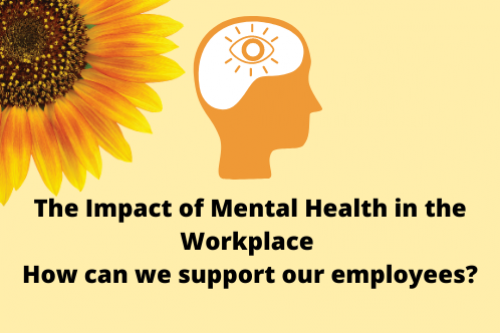The impact of Mental Health at Work – What are employees asking for?
Posted on 19th February 2021
According to a study this month by Westfield Health, the cost of absenteeism from work due to mental health reasons increased in 2020 by £1.3bn. We know that the Covid 19 pandemic is the cause of this, as the workplace and work routine changed for the majority of us. The restrictions on public transport and commuting demanded that the majority of us work from home, some in isolation, and as the furlough scheme and pay cuts were put into place, anxiety and worry arose for so many.
So, as we approach a year down the line, how can you support your employees, and what are they asking for? The same survey above tells us that:
-
28% of staff are asking for more permanent changes to the way they work, including more flexible working hours and working from home to stay.
-
28% would also like to see a more Covid-Secure office/workplace
-
26% would like more mental health support in the workplace
-
24% would like more of a positive working environment and particularly more support with wellbeing in the workplace
Considering the above, how can you help them? We have some quick tips below to help!
-
Know the signs – an employee who is struggling will often try to hide it, but there are some telltale signs which include:
-
Changes in mood
-
Lots of sighing and deep breaths
-
Anxious thinking
-
Saying I’m sorry a lot and being self critical
-
Looking tired – complaining of poor sleep
-
Difficulty concentrating and forgetfulness – saying ‘I forgot’ a lot
-
Performance or attendance issues
-
Changes in appearance
-
Sometimes withdrawn
-
More defensive or argumentative or ‘snappy’
-
Something about the person doesn’t ‘seem right’?
-
Make sure you check in – not check up – ask them how they are doing, how they are feeling and don’t just ask about work, gage their mood and let them know you are here for them.
-
Have a designated Mental Health First Aider who is trained on knowing the signs and has the knowledge and skills to support anyone struggling. This person can also be the ‘go to’ for the team to speak to, if they feel they can’t go to their manager.
-
Lead by example – let the team know how you are feeling, and encourage your senior leadership team to do the same, if one person talks, everybody will feel more comfortable in opening up, and will consider it a safer environment to share feelings and thoughts.
-
Invest in some training or courses for the whole team. It’s a great way for them to bond, and also for them to pick up tools. They will also feel supported.
-
Encourage regular breaks within the day – just because they’re at home, doesn’t mean they have to be ‘on’ 24/7 – we lack water cooler moments at home, a 10minute teams chat with a colleague is no different.
-
Encourage exercise and physical activity within the working day – make sure they are getting out at lunchtime, or booking in workouts at home if they used to go to the gym.
-
Try to create a separate work space at home, somewhere they can shut off and walk away from, and make sure all are turning their work computers off at the end of each day.
-
Ensure your managers communicate effectively
-
Provide everybody with comprehensive feedback and support
-
Share resources and support systems, let the team know what is available to them and where to find guides, literature, videos, websites etc which may help them. Ask them for their feedback
-
Always celebrate the wins – no matter how small!
-
Sending a surprise gift in the post
-
Some organisations have committed to ‘Zap free Zoom Time’ – no zooms allowed during that time to help with zoom fatigue
-
Other organisations have encouraged parents homeschooling to put homeschool time into their diary, so others understand ie ‘Teaching Maths at 3pm’ the team understand they may not be available and also the other commitments they have during this time
We recently ran a webinar on this topic, click here to watch.
If you’d like any further support or guidance, we’d be more than happy to help .We also offer some excellent Mental Wealth training courses to help support your people, ranging from a 1 hour course to a full day. Click here to find out more.

